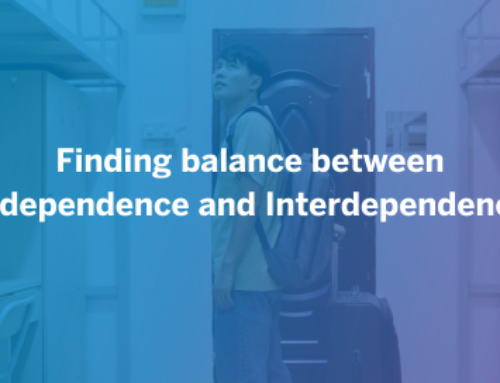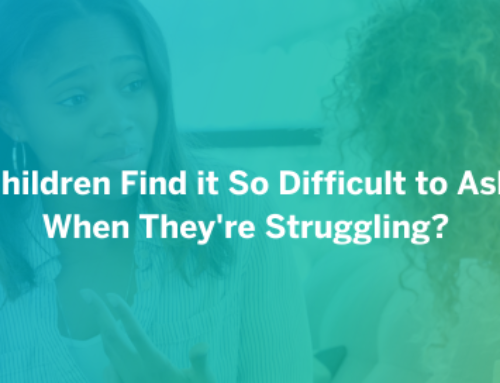
The Secret Password: Help
I struggled with depression and anxiety for years. I didn’t have a name or category for my condition. I often felt overwhelmed and isolated. In 3rd grade, I couldn’t focus in class, I began losing my belongings frequently, and I started acting out in settings where I was expected to sit down and focus. In search of a reality that felt better than the one in which I was beginning to struggle, I started lying to my friends and family routinely. I felt like there was something deeply wrong with me, driven by both the stressful and lonely impact of compulsive lying and the isolation fueled by my ignorance of the commonality of my struggles.
In middle school, I began to experience racing thoughts that felt like a relentless storm of attacks on my character, questions about my lying, and powerlessness over the countless assignments and tests I was flunking. By high school, this overthinking had begun to cause externalizing behaviors, frustration and fighting with my family, self-harm, rebelling in school, and anything to direct my attention away from the conscious stream in my head. I watched hours of online content about self-discipline and growth to try and overcome my condition but to absolutely no avail. I became attracted to those individuals for whom life seemed so much more simple, the illustrious cool kids of high school – impervious to the perils of vulnerability, all drowned out by their inside jokes. I became very rebellious. By the end of high school, I was a regular drug user. I eventually became helplessly addicted to drugs, dropped out of college, ended up in multiple psych wards, and got to know loneliness very, very well.
This is the story I tell to high schoolers during my presentations – a story of isolation, mental health crises, and addiction. It’s a story of a dishonest kid with severe ADHD who became the resident jerk of his high school, failed out of college, and landed himself in the hospital, alone, with no friends. Yet there I stand before them, confident, smiling, and brave. I speak of my beautiful relationship with my family. I tell them about my work ethic, my relationship with my amazing friends, and my happiness, which has now revealed itself to be long-term.
My explanation for this transformation is very simple: I received help. In recovery, there is an adage that we are locked out of a healthy, happy life, and the password to get in is ‘help.’ Students sometimes want to know what motivated me to improve or how I turned it around and found my way. The answer is that, for a substantial period of time, I didn’t have any motivation or any will to turn anything around. In my lowest moments, I received help. People lifted me back onto my feet and then guided me in the right direction, catching me as I fell along the way. What I had to do was take their advice and be completely honest.
I hope that by honestly and humbly discussing this with students, I can explain to them that an attitude of help-seeking is different from an attitude of quitting and victimhood. It is an attitude of humility. When I was ready to genuinely listen to the honest and caring people in life, I found tremendous relief. I hope that I can embody the power of embracing your own need for help. Upon this fearless and honest basis, I can present to them that there is nothing shameful about struggling with mental health. The first and most important message when explaining the benefits of therapy to someone is to let them know that there is absolutely no reason to feel ashamed.
Free to Open Up
The first time that I had the opportunity to begin talking about the many confusing and unfriendly thoughts that crossed my mind in front of a truly non-judgmental person, I experienced relief at a deep level. For me and many people I have spoken to, mental health struggles came with a strong sense of isolation, driven by the false notion that we were experiencing things that made us separate from others. I felt like my anxiety didn’t make sense. Surely I could tell someone I struggled, but If I really tried to explain what that was like, I would sound crazy, and they surely would not understand.
While the benefits of therapy take time, the deep sense of relief felt when exposing those most private and messy parts of yourself to a nonjudgmental person is tremendous. The process of healing begins quietly and often imperceptibly. Initially, it may take a considerable amount of time for individuals to open up and share their struggles. However, even the slow process of vulnerability is a significant step towards healing. To sit quietly and awkwardly, fumbling through the beginnings of vulnerable sharing with clear discomfort, is quite a personal process. To gradually observe that these aspects of your experience do not make you wrong or disturbed allows the struggling individual to see that they are not identified with all of their self-demeaning thoughts but rather struggling with them. They are not a twisted, sick person that is beyond repair. When I began sharing some of my deepest, most private experiences and was met with the warmth of a stoic, understanding individual, I began to heal.
The Process Takes Time
An important aspect of my experience in therapy is that it was nonlinear. I began going to therapy when I was in 11th grade and entered rehab 4 years later because I was struggling with addiction and mental health struggles. Many factors in our lives lead us to struggle. Therapy is not a cure-all. It is not a one-shot fix or a magic silver bullet. Instead, it is a helpful guide. The amount of time it takes for someone to feel relief from therapy can depend on several factors: whether they start cooperating with their therapist right away or take some time to warm up to them, whether they find a therapist who understands their needs and uses effective techniques, and whether they are open to the idea of making changes in their life.
It is crucial for those seeking therapy to understand that improvement can be difficult, confusing, and slow. A therapist is not a divine being capable of conjuring up solutions to all problems with a flick of a wand. Even the most brilliant and well-trained therapists can’t provide all the answers in a single session. There may be sessions that leave you feeling unfulfilled as if you’ve taken one step forward and two steps back. It can be disheartening to walk out of a session without the clarity or relief you were hoping for.
I remember feeling the weight of expectation as I made my way to each therapy session, hoping that I would finally hear that one thing that would lift the burden of my anxiety and insecurity. But as time went on, I realized that this moment may never come. This learning process required patience, perseverance, and a willingness to explore extremely difficult emotions.
Similar to the uncomfortable process at the beginning of therapy, those painful moments helped me more than I realized. They taught me that there often wasn’t an answer to my overthinking or my anxiety. Pathological thoughts can be like a tangled web, each strand leading to the next in an infinite loop. They are very often completely inaccurate and baseless. For me, these patterns of thought kept me trapped in a cycle of anxiety and self-doubt, preventing me from living a full and meaningful life. I remember feeling frustrated, constantly searching for answers that seemed just out of reach.
Through therapy, I began to see the senseless and cyclical nature of these patterns. I learned to sit with my thoughts and emotions without judgment, observing them from a distance rather than getting caught up in the endless chatter of my mind. I eventually could even laugh at them. This change in perspective was a major part of my healing. I began to see that I didn’t need to have all the answers and could shift my attention instead towards a positive action that would benefit me and inevitably make me feel better. This is the greatest gift therapy gave me. Importantly, it took me years to see it.
It Might Just Save Your Life
After years of confusion and years of therapy, I can look back at many moments in session and see my life changing before my eyes. I can see myself coming to therapy one day and realizing that I was allowed to be okay; without solving anything. I could just have a good day. I didn’t need to stress and strain the whole session. That was one of the most valuable lessons I had learned to date. I didn’t need to prove the 40 statements of insecurity my brain sent me a day wrong before putting a smile on my face.
I can look back at the moment when, in a group therapy setting, I spoke of childhood experiences that I expected to take to the grave. Looking around at everyone’s reactions, I suddenly realized that nobody looked at me any differently. It was a profound moment of connection and healing, and it gave me the courage to keep going on my journey towards self-discovery and growth. People just wanted to help.
But what stands out most to me about my therapy journey is the overall progression that took place. With the help of many loving and professional guides, I began to look within and confront the patterns of thought and behavior that had been holding me back for so long. It was a difficult and often painful process, but with time and guidance, I learned to stop running away from my problems and start facing them head-on. To begin this journey and to continue it, I had to admit that I was certainly, and shamelessly, in need of help. It is the best decision I have ever made.
By: Danny Z
Danny is a in house LSIS Prevention Speaker.








Leave A Comment